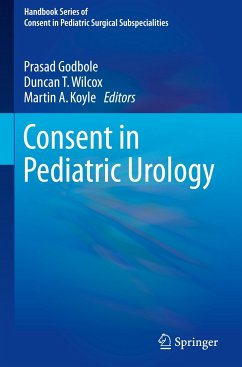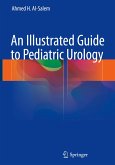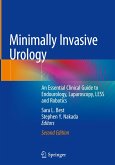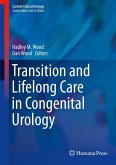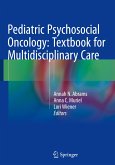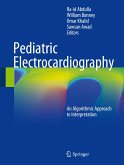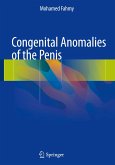Consent in Pediatric Urology
Herausgegeben:Godbole, Prasad; Wilcox, Duncan T.; Koyle, Martin A.
Consent in Pediatric Urology
Herausgegeben:Godbole, Prasad; Wilcox, Duncan T.; Koyle, Martin A.
- Gebundenes Buch
- Merkliste
- Auf die Merkliste
- Bewerten Bewerten
- Teilen
- Produkt teilen
- Produkterinnerung
- Produkterinnerung
This comprehensive handbook of consent in surgical subspecialities is dedicated to the risks and complications that a child needs to be consented for in the vast majority of pediatric surgical procedures with evidence base and outcomes.
The chapters address common and rare complications encountered in pediatric subspeciality practice which clinicians need to be aware of to allow them to take fully informed consent. The contributors are renowned for their expertise in pediatric urology and provide evidence and outcome based areas for consent in the first book of the series: 'Consent in Pediatric Urology'.…mehr
Andere Kunden interessierten sich auch für
![An Illustrated Guide to Pediatric Urology An Illustrated Guide to Pediatric Urology]() Ahmed H. Al- SalemAn Illustrated Guide to Pediatric Urology150,99 €
Ahmed H. Al- SalemAn Illustrated Guide to Pediatric Urology150,99 €![Minimally Invasive Urology Minimally Invasive Urology]() Minimally Invasive Urology97,99 €
Minimally Invasive Urology97,99 €![Transition and Lifelong Care in Congenital Urology Transition and Lifelong Care in Congenital Urology]() Transition and Lifelong Care in Congenital Urology75,99 €
Transition and Lifelong Care in Congenital Urology75,99 €![Pediatric Psychosocial Oncology: Textbook for Multidisciplinary Care Pediatric Psychosocial Oncology: Textbook for Multidisciplinary Care]() Pediatric Psychosocial Oncology: Textbook for Multidisciplinary Care106,99 €
Pediatric Psychosocial Oncology: Textbook for Multidisciplinary Care106,99 €![Pediatric Electrocardiography Pediatric Electrocardiography]() Pediatric Electrocardiography64,99 €
Pediatric Electrocardiography64,99 €![Congenital Anomalies of the Penis Congenital Anomalies of the Penis]() Mohamed FahmyCongenital Anomalies of the Penis75,99 €
Mohamed FahmyCongenital Anomalies of the Penis75,99 €![Clinical Urodynamics in Childhood and Adolescence Clinical Urodynamics in Childhood and Adolescence]() Clinical Urodynamics in Childhood and Adolescence90,99 €
Clinical Urodynamics in Childhood and Adolescence90,99 €-
-
-
This comprehensive handbook of consent in surgical subspecialities is dedicated to the risks and complications that a child needs to be consented for in the vast majority of pediatric surgical procedures with evidence base and outcomes.
The chapters address common and rare complications encountered in pediatric subspeciality practice which clinicians need to be aware of to allow them to take fully informed consent. The contributors are renowned for their expertise in pediatric urology and provide evidence and outcome based areas for consent in the first book of the series: 'Consent in Pediatric Urology'.
The chapters address common and rare complications encountered in pediatric subspeciality practice which clinicians need to be aware of to allow them to take fully informed consent. The contributors are renowned for their expertise in pediatric urology and provide evidence and outcome based areas for consent in the first book of the series: 'Consent in Pediatric Urology'.
Produktdetails
- Produktdetails
- Handbook Series of Consent in Pediatric Surgical Subspecialities
- Verlag: Springer / Springer International Publishing / Springer, Berlin
- Artikelnr. des Verlages: 978-3-319-43526-8
- 1st ed. 2016
- Seitenzahl: 312
- Erscheinungstermin: 21. Dezember 2016
- Englisch
- Abmessung: 241mm x 160mm x 22mm
- Gewicht: 635g
- ISBN-13: 9783319435268
- ISBN-10: 3319435264
- Artikelnr.: 45237607
- Herstellerkennzeichnung
- Springer-Verlag GmbH
- Tiergartenstr. 17
- 69121 Heidelberg
- ProductSafety@springernature.com
- Handbook Series of Consent in Pediatric Surgical Subspecialities
- Verlag: Springer / Springer International Publishing / Springer, Berlin
- Artikelnr. des Verlages: 978-3-319-43526-8
- 1st ed. 2016
- Seitenzahl: 312
- Erscheinungstermin: 21. Dezember 2016
- Englisch
- Abmessung: 241mm x 160mm x 22mm
- Gewicht: 635g
- ISBN-13: 9783319435268
- ISBN-10: 3319435264
- Artikelnr.: 45237607
- Herstellerkennzeichnung
- Springer-Verlag GmbH
- Tiergartenstr. 17
- 69121 Heidelberg
- ProductSafety@springernature.com
Duncan T Wilcox Professor, Chair, Pediatric Urology The Children's Hospital University of Colorado Denver School of Medicine Dr. Duncan Wilcox is fellowship-trained in Pediatric Urology. He is quickly developing a busy practice in Pediatric Urology at The Children's Hospital. Dr. Wilcox is extremely qualified in a broad scope of urologic surgery including: penile surgery specifically hypospadias , groin surgery and performs robotic and laparoscopic renal surgery as well as major reconstructive bladder surgery. He trained at the University of London and completed his residency there. He completed his fellowship in Pediatric Urology at the University of London at Great Ormond Street Children's Hospital. Special areas of interest are hypospadias surgery, genitourinary problems in patients born with imperforate anus and patients with spinal defects. He is an investigator in a number of clinical outcome studies specifically involving hypospadias, undescended testicles and patients with hydronephrosis. He has a long term research interest in the clinical problems associated with patients born with imperforate anus and works closely with the Pediatric Surgeons at The Children's Hospital to provide comprehensive multidisciplinary care to these patients. Martin A Koyle, Professor of Surgery and Program Director, University of Toronto and Hospital for Sick Children Martin Koyle is a pediatric urologist, currently living in Toronto, Canada. There he serves as Professor of Surgery and Program Director, Pediatric Urology at the University of Toronto and the Hospital for Sick Children. After growing up in Canada where he received his medical degree (1976), he trained in surgery at Los Angeles County- USC Medical Center and in urology at Harvard Program centered at the Brigham and Women's Hospital in Boston (1980-1984). He then advanced through academic posts at UCLA (1984-1989), University of Colorado and The Children's Hospital (1989-2008), and the University of Washington and Seattle Children's Hospital (2008-2011). During his almost 3 decades in academic urology, Dr. Koyle has been known for his multiple innovations and contributions to the fields of pediatric urology and transplantation. He was the first to publish on laparoscopic nephrectomy in infants, introduced the MACE (Malone Antegrade Continence Enema), the Bianchi technique (single incision orchidopexy) and the Bracka hypospadias repair to North America, and also one of the first surgeons to gain experience in the tubularized incised urethral plate hypospadias repair (Snodgrass technique) and to demonstrate its applicability beyond North America to Europe and Asia. He invented and patented the Koyle stent (Cook Inc), which is used around the world for hypospadias and urethral surgery. To date, he has contributed over 200 major publications and chapters to the literature. Recently he has been a co-editor tothe textbooks, "Pediatric Urology- Surgical Complications and Management" and "Guide to Pediatric Urology and Surgery in Clinical Practice". He is Associate Editor of Dialogues in Pediatric Urology and serves on the editorial boards of Pediatric Surgery International and the Journal of Pediatric Urology. Dr Koyle is past president of the Rocky Mountain Urology Society, the Society for Pediatric Urology, and the American Association of Pediatric Urologists. He is a Fellow of the American College of Surgeons, Fellow of the American Academy of Pediatrics, and Fellow of the Society for Pediatric Urology. In January, 2010, he was elected "on merit" as Fellow of the Royal College of Surgeons in England for his contributions to urology, pediatric surgery, and pediatric urology in the internationally, and in particular in the British Isles. Prasad P Godbole, Consultant Paediatric Urologist and Honorary Senior Lecturer Clinical Director for Surgery < Sheffield Children's NHS Foundation Trust and University of Sheffield Sheffield, UK Mr Godbole is a Consultant Paediatric Urologist at the Sheffield Children's NHS Foundation Trust. He trained in Sheffield and Leeds as a Paediatric Surgeon prior to subspecialising in Paediatric Urology at the world renowned Great Ormond Street Hospital for Children and Guys Hospital in London. He was a Consultant Paediatric Urologist at Great Ormond Street Hospital for Children prior to taking up his current appointment. He provides the majority of the paediatric urology service for children in South Yorkshire, UK. Mr Godbole has a special interest in reconstructive urology including hypospadias and minimally invasive management of urinary tract stone disease in children. He also has an interest intractable wetting disorders in children and its treatment. He also specialises in the antenatal counselling of urological abnormalities and their management after birth. He is a member of several well recognised paediatric urological organisations and has been awarded the Fellowship of the European Academy of Pediatric Urology (FEAPU). He regularly lectures on courses and seminars, has edited several textbooks of Paediatric Urology and has published over 50 articles in peer reviewed journals and textbooks of paediatric urology. He also has a strong research interest in the management of daytime wetting disorders with 4 ongoing research projects and 2 completed research projects in this field. He is an invited visiting Professor to Kurdistan in Northern Iraq and to Moscow, Russia where he undertakes teaching and training sessions.
Part 1. Introduction.- 1. Why and how is consent obtained?.- Part 2. Open surgery of the upper urinary tract.- 2. Open Nephrectomy.- 3. Partial nephrectomy.- 4. Urtereopelvic junction obstruction.- 5. Antireflux surgery.- 6. Open Ureteral surgery: ureteroureterostomy and Transureteroureterostomy.- Part 3. Surgery of the bladder.- 7. Epispadias and bladder exstrophy.- Part 4. Endoscopic surgery of the urinary tract.- 8. Cystoscopy and cystoscopic interventions.- 9. Minimally invasive interventions for stone disease.- 10. General laparoscopy.- 11. Laparoscopic surgery of the upper urinary tract.- 12. Robot-assisted Laparoscopic ureteral reimplantation.- Part 5. Genitalia.- 13. Hydrocele and Hernia.- 14. Orchidopexy and orchidectomy.- 15. Laparoscopic orchidopexy.- 16. Varicocelectomy.- 17. Consent for Circumcision.- 18. Hypospadias Repair.- 19. Surgery for correction of disorders of sex development.- 20. Surgery for Persistent cloaca.- Part 6.Renal Impairment Surgery.- 21. Hemodialysis and peritoneal dialysis.- 22. Kidney transplantation.- Part 7. Urogenital Tumours.- 23. Wilm's tumour and other renal neoplasms.- 24. Bladder and/or Prostate Rhabdomyosarcoma. 25. Testicular and Paratesticular tumors of Children and Adolescents.- Part 8. Trauma.- 26. Genital trauma.- 27. Urinary tract trauma.- Part 9. Surgery for urinary incontinence.- 28. Augmentation Cystoplasty and Diversion.- 29. Appendicovesicostomy and ileovesicostomy.- 30. Informed Consent Prior to Malone Antegrade Continence Enema: Surgery for Fecal Incontinence.
Part 1. Introduction.- 1. Why and how is consent obtained?.- Part 2. Open surgery of the upper urinary tract.- 2. Open Nephrectomy.- 3. Partial nephrectomy.- 4. Urtereopelvic junction obstruction.- 5. Antireflux surgery.- 6. Open Ureteral surgery: ureteroureterostomy and Transureteroureterostomy.- Part 3. Surgery of the bladder.- 7. Epispadias and bladder exstrophy.- Part 4. Endoscopic surgery of the urinary tract.- 8. Cystoscopy and cystoscopic interventions.- 9. Minimally invasive interventions for stone disease.- 10. General laparoscopy.- 11. Laparoscopic surgery of the upper urinary tract.- 12. Robot-assisted Laparoscopic ureteral reimplantation.- Part 5. Genitalia.- 13. Hydrocele and Hernia.- 14. Orchidopexy and orchidectomy.- 15. Laparoscopic orchidopexy.- 16. Varicocelectomy.- 17. Consent for Circumcision.- 18. Hypospadias Repair.- 19. Surgery for correction of disorders of sex development.- 20. Surgery for Persistent cloaca.- Part 6.Renal Impairment Surgery.- 21. Hemodialysis and peritoneal dialysis.- 22. Kidney transplantation.- Part 7. Urogenital Tumours.- 23. Wilm's tumour and other renal neoplasms.- 24. Bladder and/or Prostate Rhabdomyosarcoma. 25. Testicular and Paratesticular tumors of Children and Adolescents.- Part 8. Trauma.- 26. Genital trauma.- 27. Urinary tract trauma.- Part 9. Surgery for urinary incontinence.- 28. Augmentation Cystoplasty and Diversion.- 29. Appendicovesicostomy and ileovesicostomy.- 30. Informed Consent Prior to Malone Antegrade Continence Enema: Surgery for Fecal Incontinence.

